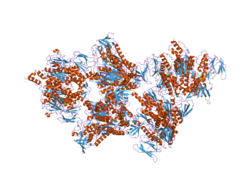二氢硫辛酰胺脱氢酶(EC 1.8.1.4,英语:Dihydrolipoamide dehydrogenase,缩写DLD,又称为线粒体二氢硫辛酸脱氢酶,dihydrolipoyl dehydrogenase, mitochondrial)是一种由人类基因DLD[1][2][3][4]所编码的黄素蛋白,其作用是将二氢硫辛酰胺脱氢从而转化为氧化型硫辛酰胺。
DLD作为一种线粒体蛋白质,在真核生物的能量代谢中起到重要作用,它至少参与了五种多酶复合体,且为复合体完成反应所必需的组份[5]。另外,DLD作为一种黄素蛋白氧化还原酶,以FAD为辅基接受质子与电子催化二硫键的形成。
DLD是大小为51千道尔顿亚基的同二聚体,其中每个亚基都与一分子的FAD以共价键的形式相连[6]。
功能
在哺乳动物的线粒体三羧酸循环中,该酶与丙酮酸脱氢酶和二氢硫辛酰基乙酰基转基酶一起组成中丙酮酸脱氢酶复合体,同时该酶亦是α-酮戊二酸脱氢酶复合体中的一个组分。二氢硫辛酰胺脱氢酶的主要任务是负责将复合物中另一组分硫辛酰胺转乙酰基酶(或二氢硫辛酰琥珀酰转移酶)的辅基二氢硫辛酰胺脱氢从而转化为氧化型硫辛酰胺,该酶也是线粒体甘氨酸剪切体系的组分。
参考文献
- ↑ Entrez Gene: dihydrolipoamide dehydrogenase.
- ↑ Otulakowski G, Robinson BH. Isolation and sequence determination of cDNA clones for porcine and human lipoamide dehydrogenase. Homology to other disulfide oxidoreductases. J. Biol. Chem.. December 1987, 262 (36): 17313–8. PMID 3693355.
- ↑ Pons G, Raefsky-Estrin C, Carothers DJ, Pepin RA, Javed AA, Jesse BW, Ganapathi MK, Samols D, Patel MS. [http//www.ncbi.nlm.nih.gov/pmc/articles/PMC279783/ Cloning and cDNA sequence of the dihydrolipoamide dehydrogenase component human alpha-ketoacid dehydrogenase complexes]. Proc. Natl. Acad. Sci. U.S.A.. March 1988, 85 (5): 1422–6. doi:10.1073/pnas.85.5.1422. PMID 3278312. PMC 279783.
- ↑ Scherer SW, Otulakowski G, Robinson BH, Tsui LC. Localization of the human dihydrolipoamide dehydrogenase gene (DLD) to 7q31----q32. Cytogenet. Cell Genet.. 1991, 56 (3-4): 176–7. doi:10.1159/000133081. PMID 2055113.
- ↑ Babady NE, Pang YP, Elpeleg O, Isaya G. [http//www.ncbi.nlm.nih.gov/pmc/articles/PMC1851069/ Cryptic proteolytic activity of dihydrolipoamide dehydrogenase]. Proceedings of the National Academy of Sciences of the United States of America. 2007, 104 (15): 6158–63. doi:10.1073/pnas.0610618104. PMID 17404228. PMC 1851069.
- ↑ Ciszak EM, Makal A, Hong YS, Vettaikkorumakankauv AK, Korotchkina LG, Patel MS. How dihydrolipoamide dehydrogenase-binding protein binds dihydrolipoamide dehydrogenase in the human pyruvate dehydrogenase complex. The Journal of Biological Chemistry. 2006, 281 (1): 648–55. doi:10.1074/jbc.M507850200. PMID 16263718.
深入阅读
- Silverberg MS, Cho JH, Rioux JD, et al.. [http//www.ncbi.nlm.nih.gov/pmc/articles/PMC2652837/ Ulcerative colitis-risk loci on chromosomes 1p36 and 12q15 found by genome-wide association study.]. Nat. Genet.. 2009, 41 (2): 216–20. doi:10.1038/ng.275. PMID 19122664. PMC 2652837.
- Scherer SW, Cheung J, MacDonald JR, et al.. [http//www.ncbi.nlm.nih.gov/pmc/articles/PMC2882961/ Human chromosome 7: DNA sequence and biology.]. Science. 2003, 300 (5620): 767–72. doi:10.1126/science.1083423. PMID 12690205. PMC 2882961.
- Brautigam CA, Chuang JL, Tomchick DR, et al.. Crystal structure of human dihydrolipoamide dehydrogenase: NAD+/NADH binding and the structural basis of disease-causing mutations.. J. Mol. Biol.. 2005, 350 (3): 543–52. doi:10.1016/j.jmb.2005.05.014. PMID 15946682.
- , Barrett JC, Lee JC, et al.. Genome-wide association study of ulcerative colitis identifies three new susceptibility loci, including the HNF4A region.. Nat. Genet.. 2009, 41 (12): 1330–4. doi:10.1038/ng.483. PMID 19915572.
- Reed LJ, Hackert ML. Structure-function relationships in dihydrolipoamide acyltransferases.. J. Biol. Chem.. 1990, 265 (16): 8971–4. PMID 2188967.
- Ciszak EM, Makal A, Hong YS, et al.. How dihydrolipoamide dehydrogenase-binding protein binds dihydrolipoamide dehydrogenase in the human pyruvate dehydrogenase complex.. J. Biol. Chem.. 2006, 281 (1): 648–55. doi:10.1074/jbc.M507850200. PMID 16263718.
- Asano K, Matsushita T, Umeno J, et al.. A genome-wide association study identifies three new susceptibility loci for ulcerative colitis in the Japanese population.. Nat. Genet.. 2009, 41 (12): 1325–9. doi:10.1038/ng.482. PMID 19915573.
- Odièvre MH, Chretien D, Munnich A, et al.. A novel mutation in the dihydrolipoamide dehydrogenase E3 subunit gene (DLD) resulting in an atypical form of alpha-ketoglutarate dehydrogenase deficiency.. Hum. Mutat.. 2005, 25 (3): 323–4. doi:10.1002/humu.9319. PMID 15712224.
- Brautigam CA, Wynn RM, Chuang JL, et al.. Structural insight into interactions between dihydrolipoamide dehydrogenase (E3) and E3 binding protein of human pyruvate dehydrogenase complex.. Structure. 2006, 14 (3): 611–21. doi:10.1016/j.str.2006.01.001. PMID 16442803.
- Kim H. Activity of human dihydrolipoamide dehydrogenase is largely reduced by mutation at isoleucine-51 to alanine.. J. Biochem. Mol. Biol.. 2006, 39 (2): 223–7. PMID 16584639.
- Sugden MC, Holness MJ. Recent advances in mechanisms regulating glucose oxidation at the level of the pyruvate dehydrogenase complex by PDKs.. Am. J. Physiol. Endocrinol. Metab.. 2003, 284 (5): E855-62. doi:10.1152/ajpendo.00526.2002. PMID 12676647.
- Wang YC, Wang ST, Li C, et al.. The role of amino acids T148 and R281 in human dihydrolipoamide dehydrogenase.. J. Biomed. Sci.. 2008, 15 (1): 37–46. doi:10.1007/s11373-007-9208-9. PMID 17960497.
- Brown AM, Gordon D, Lee H, et al.. Association of the dihydrolipoamide dehydrogenase gene with Alzheimer's disease in an Ashkenazi Jewish population.. Am. J. Med. Genet. B Neuropsychiatr. Genet.. 2004, 131B (1): 60–6. doi:10.1002/ajmg.b.30008. PMID 15389771.
- Babady NE, Pang YP, Elpeleg O, Isaya G. Cryptic proteolytic activity of dihydrolipoamide dehydrogenase.. Proc. Natl. Acad. Sci. U.S.A.. 2007, 104 (15): 6158–63. doi:10.1073/pnas.0610618104. PMID 17404228.
- Wang YC, Wang ST, Li C, et al.. The role of N286 and D320 in the reaction mechanism of human dihydrolipoamide dehydrogenase (E3) center domain.. J. Biomed. Sci.. 2007, 14 (2): 203–10. doi:10.1007/s11373-006-9136-0. PMID 17171578.
- Foster LJ, Rudich A, Talior I, et al.. Insulin-dependent interactions of proteins with GLUT4 revealed through stable isotope labeling by amino acids in cell culture (SILAC).. J. Proteome Res.. 2006, 5 (1): 64–75. doi:10.1021/pr0502626. PMID 16396496.
- Kim H. Asparagine-473 residue is important to the efficient function of human dihydrolipoamide dehydrogenase.. J. Biochem. Mol. Biol.. 2005, 38 (2): 248–52. PMID 15826505.
- Hiromasa Y, Fujisawa T, Aso Y, Roche TE. Organization of the cores of the mammalian pyruvate dehydrogenase complex formed by E2 and E2 plus the E3-binding protein and their capacities to bind the E1 and E3 components.. J. Biol. Chem.. 2004, 279 (8): 6921–33. doi:10.1074/jbc.M308172200. PMID 14638692.
- Wynn RM, Kato M, Machius M, et al.. Molecular mechanism for regulation of the human mitochondrial branched-chain alpha-ketoacid dehydrogenase complex by phosphorylation.. Structure. 2004, 12 (12): 2185–96. doi:10.1016/j.str.2004.09.013. PMID 15576032.
- Martins-de-Souza D, Gattaz WF, Schmitt A, et al.. [http//www.ncbi.nlm.nih.gov/pmc/articles/PMC2684104/ Proteome analysis of schizophrenia patients Wernicke's area reveals an energy metabolism dysregulation.]. BMC Psychiatry. 2009, 9: 17. doi:10.1186/1471-244X-9-17. PMID 19405953. PMC 2684104.
外部链接
二氢硫辛酰胺脱氢酶引用了美国国家医学图书馆提供的资料,这些资料属于公共领域。
参考来源
更多医学百科条目


